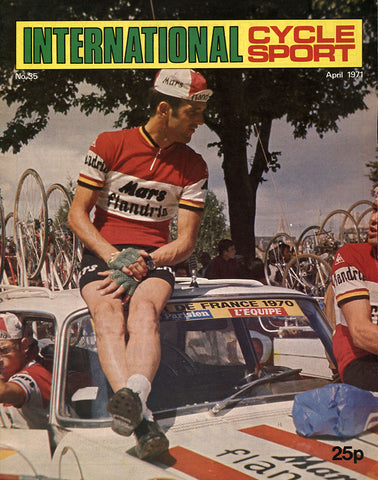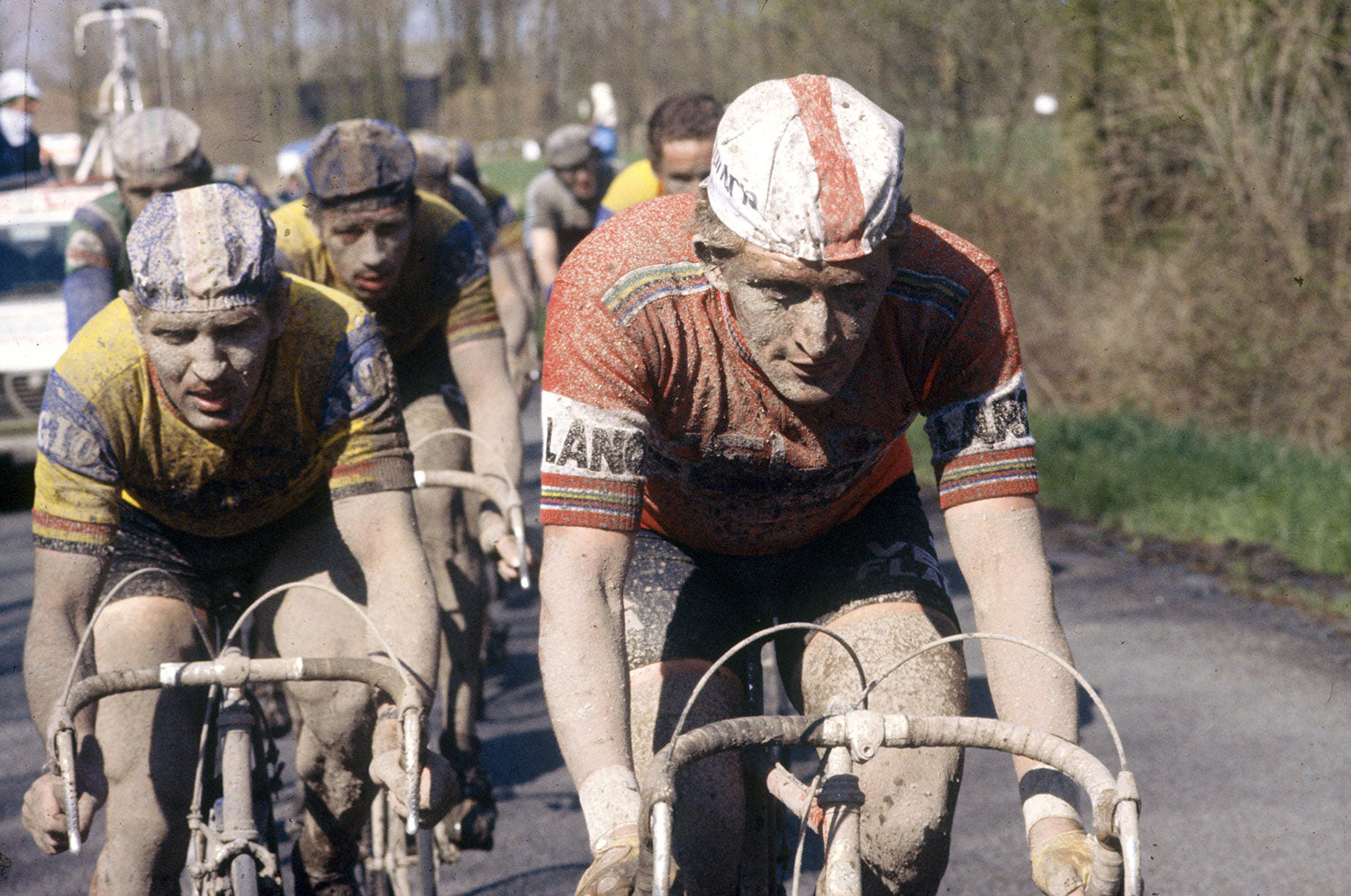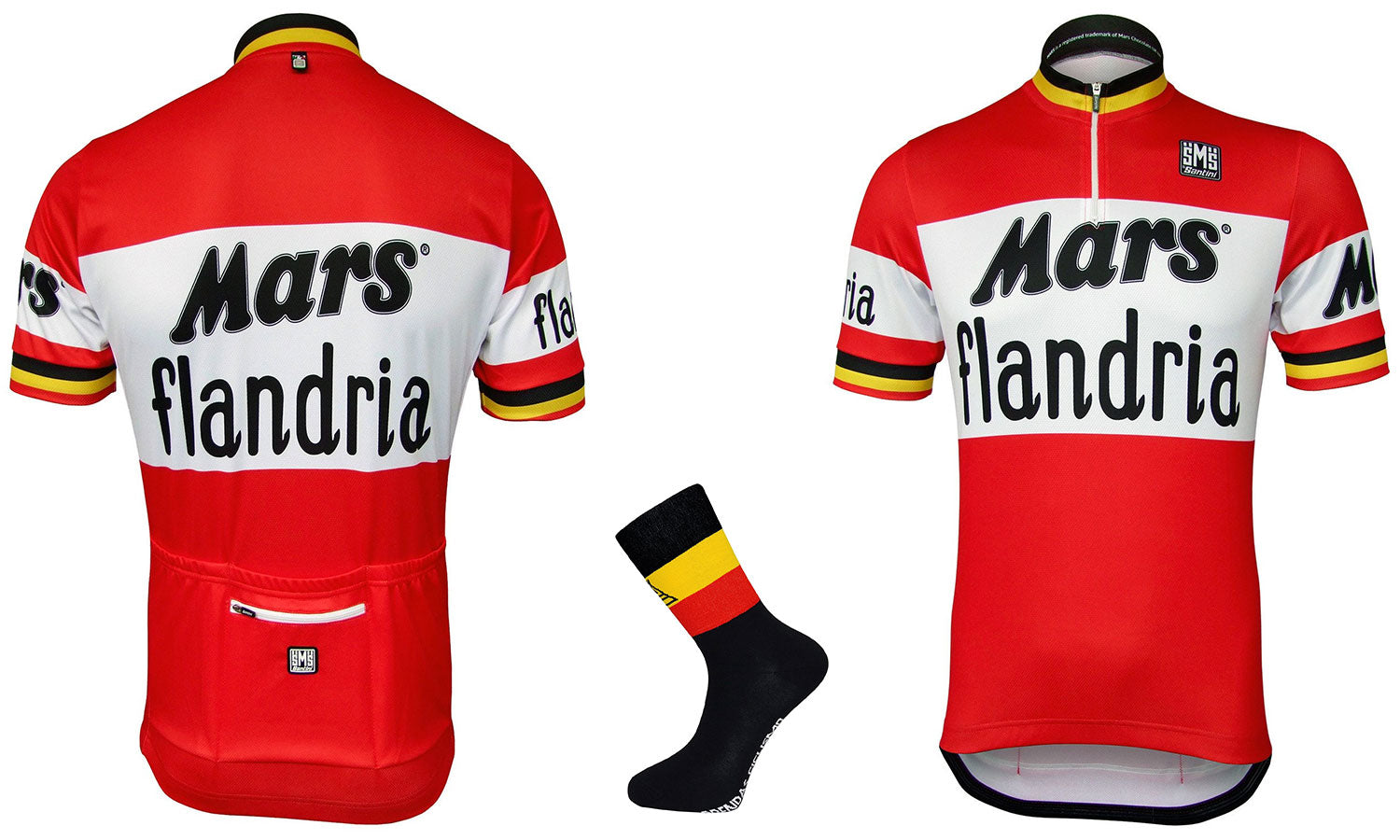QUALITY CYCLING CLOTHING SINCE 1996 - THE UK'S FIRST RETRO MANUFACTURER
QUALITY CYCLING CLOTHING SINCE 1996 - THE UK'S FIRST RETRO MANUFACTURER
RETRO APPAREL
COLLECTIONS
Cycling Clothing
ACCESSORIES
About The Flandria Cycling Team
June 18, 2019 5 min read

Brothers Roger and Eric De Vlaeminck during the 1970 season. Photo Credit: Offside / L'Equipe.
Pedr Charlesworth delves into the story behind the Flandria cycling team that boasted leaders such as Rik Van Looy, Roger De Vlaeminck, Walter Godefroot and Freddy Maertens.
When do personal prospects of glory overpower team loyalty?
For each domestique this point shall vary, yet, knowing you have the legs to take home Paris-Roubaix, is likely more than enough for most. Coming into the final kilometres of the 1958 edition, riding from Faema-Guerra, Leon Vandaele had to quickly come to terms with this predicament. A strong finisher on his day, the young Belgian rolled the dice, outsprinting his own team leader, The Emperor – Rik Van Looy, in a 10-man bunch sprint to claim his maiden monument victory. Van Looy was furious. Little could be done to quell his temper with the young gun, when Vandaele repeated the feat at the end-of-season Championship of Flanders race. Unsurprisingly, he soon found himself searching for a new team.
After a chance meeting with the founder of Flandria bikes one sunny Sunday morning, Vandaele found himself propelled back in the pro peloton as part of the brand-new outfit. He repaid their faith in building a team around him with 1st place and Gent-Wevelgem, and 3rd at Milan-San Remo, as well as the team taking an impressive 44 total victories that season.
From a conversation over coffee, Flandria had quickly become a respected force on the pro circuit, so it wasn’t without irony when Van Looy joined the team he unwittingly forced into fruition. Flandria became Faema-Flandria, and with Van Looy at the pinnacle of his career, the team became a powerhouse during the 1962 season. By the end of the year, he and the pioneering Red Guard had stormed to victory at the Tour of Flanders, Gent-Wevelgem and Paris-Roubaix.
After the success of that 1962 season, Flandria invested heavily over the coming years, becoming the main team sponsor that brought with it a new ethos. With Van Looy moving over to G.B.C-Libertas the following season, the Belgian team moved onto its next of many iterations, focussing its efforts in building an all-round strong squad. The success of new signings, Walter Godefroot and Eric Lehman, laid the foundations that would attract the next wave of Belgian talent in Roger De Vlaeminck and later Freddy Maetens to the team.
 At the turn of the decade, Flandria were looking for another co-sponsor to fund their ever-growing roster of riders. At the time, the Slough-based chocolate company Mars were looking to launch the Mars bar in Belgium; advertising on the jersey of the country’s most successful cycling team seemed like a no-brainer, hence the Mars-Flandria jersey was created. Under the new name, that 1970 season saw the neo-pro Roger De Vlaeminck storm through the peloton in Flandria red, taking home Liège-Bastogne-Liège, stage 6 of the Tour de France and Kuurne-Brussels-Kuurne. With all eyes now firmly set upon the team, and Mars Bar now successfully launched, Mars withdrew their funding as the team was forced once again to evolve.
At the turn of the decade, Flandria were looking for another co-sponsor to fund their ever-growing roster of riders. At the time, the Slough-based chocolate company Mars were looking to launch the Mars bar in Belgium; advertising on the jersey of the country’s most successful cycling team seemed like a no-brainer, hence the Mars-Flandria jersey was created. Under the new name, that 1970 season saw the neo-pro Roger De Vlaeminck storm through the peloton in Flandria red, taking home Liège-Bastogne-Liège, stage 6 of the Tour de France and Kuurne-Brussels-Kuurne. With all eyes now firmly set upon the team, and Mars Bar now successfully launched, Mars withdrew their funding as the team was forced once again to evolve.
Evolution came in more forms than just financing however, as the team went against the grain by fitting their bikes with Japanese Shimano components - as opposed to the more conventional Campagnolo. The Italian manufacturer had been a staple in the scene since the early 1930s, hence Flandria’s decision was met with great scepticism by the public. The new relationship proved to be a fruitful one however, with Shimano promising to develop the team a custom line of components based on their feedback - these were to be known as the Dura-Ace range. One look at the pro peloton today shows just what a pioneering decision this was.
The changing of component manufacturer, however, wasn’t the only addition for the 1973 season. It was the year that the final member of what would become the three musketeers was successfully signed to the team. Michel Pollentier joined Marc Demeyer and Freddy Maertens in the Flandria roster, as they became the third prong in the cycling’s super-team trident, of Eddy Merckx’s Molteni-Arcore, and Roger De Vlaeminck’s Brooklyn Gum. Despite riding for Maertens, the pedigree of Pollentier and Demeyer was such that they too, often emerged victorious from the most prestigious of races. As seen in Jørgen Leth’s documentary – A Sunday in Hell – when Maertens crashes out the race, Demeyer fends off Roger De Vlaeminck to take the title for Flandria.

A muddy Freddy Maertens leads the field in the 1978 edition of Paris-Roubaix. Photo credits: Offside / L'Equipe.
Unsated by their tremendous success in the classics, the team doggedly pursued victory on cycling’s biggest stages – the Grand Tours. With the Musketeers now firing on all cylinders, Maertens won the points classification of the 1976 Tour de France, before taking home both the general, and points jerseys in the following year’s Vuelta a España. Just 5 days later he won the prologue of the Giro d’Italia, where he was amongst the favourites for the overall win. After dominating the early stages - retaining the Maglia Rosa general classification jersey until stage 5 - and taking 7 stage wins, he cruelly fell foul of an elbow in a bunch sprint. As the crowds dissipated from Circuito del Mugello, Maertens was forced to retire from the race with a broken wrist.
17 years on from the team’s inception, there was no lack of loyalty in the ranks here, as the remaining riders supposedly voted to leave the race in solidarity to their leader. It goes that Maertens convinced them to continue in his absence, to fight tooth and nail against Francesco Moser’s Sanson team for what remained of the race. In a remarkable turn of events from the fired up Flandria outfit, Demeyer went on to win two more stages, whilst Pollentier found fine form in the Dolomites. Outclimbing Moser, the Belgian caused a monumental upset for the home fans - taking back the Maglia Rosa in the closing stages and in doing so cementing the finest victory of his career.
After a full circle from one domestique’s victory to another, Flandria was instrumental to stirring revolutions outside just those of spoke and wheel. From the advent of Dura-Ace and the Red Guard to the first professional contracts of Freddy Maertens and Roger de Vlaeminck; the team that brought the Mars Bar to Belgium left a truly sweet taste in the mouths of many more than just its proud Flandrien supporters.

You can buy the Mars Flandria retro cycling jersey and Belgian Champion cycling socks at Prendas Ciclismo.
Also in News and articles from Prendas Ciclismo

Prendas' Best-Selling Caps of 2024
January 21, 2025 4 min read
With 2024 in the books, we're looking back at your favourite caps of the year. From cult classic movies to the jungle with a whole lot of Italian flair, check out our best-sellers and grab a new cap!

Vas-y Barry! Hoban wins Ghent-Wevelgem for Gan Mercier Hutchinson
May 15, 2024 8 min read
In an extract from his autobiography, Vas-y Barry, the only British winner of Ghent-Wevelgem, Barry Hoban tells how he won the cobbled classic in 1974, beating Eddy Merckx and the cream of Belgian cycling.

Our Best Selling Caps of 2023
January 15, 2024 4 min read
We know caps here at Prendas Ciclismo, and we know that you love all the styles we have on offer. So every year, we look back at our best-selling cycling caps for the previous year for you to discover a few new styles. Is your favourite cycling cap featured on our list? Read on and see!
Subscribe
Sign up to get the latest on sales, new releases and more …

